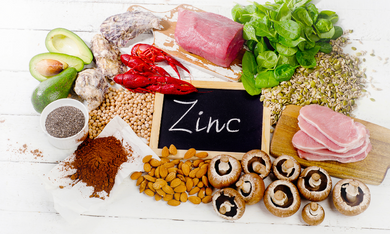1. What Is It?
Zinc is an essential micronutrient that can be considered crucial in some way to every element of our health! Even more importantly, the human body cannot produce zinc and therefore we need to consume it through our diet and supplementation. Zinc is the second most abundant trace mineral in the body, with Iron being the most abundant trace mineral. Typical food sources of zinc include shellfish, meat, poultry, fish, legumes, nuts and seeds.
Zinc supplements come in many forms on the market that include Zinc gluconate, Zinc acetate, Zinc sulphate, Zinc picolinate, Zinc orotate & Zinc citrate. Zinc gluconate is the most commonly used form that you will see in a lot of cold medicines, lozenges and nasal sprays. We are not going to be focusing on any particular form of Zinc, instead, the properties of Zinc supplementation as a whole.
2. What Does It Do?
DNA & Protein Synthesis
Deficiencies in zinc have been associated with decreases in protein synthesis. It was found that low levels of zinc resulted in a lower rate of hepatic protein synthesis which one of the metabolic functions of the liver. There was also a link between this deficiency caused decrease in protein synthesis and the formation and health of our cells. Zinc stabilizes the structure of our DNA (and RNA) as it is abundant within the cell nucleus, nucleolus and chromosomes.
Decrease Inflammation
Zinc is considered to exhibit almost ‘antioxidant like’ effects towards inflammation. Zinc reduces oxidative stress in the body which is a key component of the increase of inflammation in the body. By reducing oxidative stress, the cells in the body are not being deteriorated and inflammation markers are shown to be decreased. A study showed that supplementation of zinc in older adults showed a significant reduction in inflammatory markers compared to the placebo group.
Support Immune Function
As we mentioned earlier, zinc is commonly seen in cold and flu medicines due to it’s believed effect of supporting the bodies immune system. This support of the immune system does tie into the previous two benefits we have addressed. By supporting the synthesis of DNA and protein we will be able to fight off infections that may try to infect the body, the same with decreasing inflammation. By reducing inflammation and oxidative stress in the body, it will be in an incredibly stronger position to fight off a common cold.
Additionally, a severe deficiency of zinc has been linked to a suppressed immune system. More so, a zinc deficiency has been linked to susceptibility to pneumonia and other infections in children and the elderly. The body requires zinc to develop and activate T-lymphocytes, a type of white blood cell, that is an essential part of the immune system to help fight off infections.
Support Blood Sugar Control
Zinc has been associated with the management of blood sugar levels as well as the secretion of insulin. Insulin is the hormone that is responsible for removing glucose from the blood and to the tissue to, therefore, lower and stabilize our blood sugar levels. Lower levels of zinc have been studied in individuals with diabetes, a condition where the body struggles to maintain blood sugar level stability. More studies are needed to be conducted but so far it is being suggested that zinc supplementation has been shown to enhance both short-term and long-term blood sugar management in those with diabetes.
3. How Much Do I Need To Take?
Zinc is an essential trace mineral, and with that come a wide variety of guidelines as to the daily recommended intake of zinc. For most typical adults that are not suffering from any medical conditions a daily intake between 15 – 30 mg per day is adequate. Typically the adult will consume 10 – 15 mg of zinc through their diet, which is why using a zinc supplement may be necessary.
When looking at zinc supplements, as we mentioned at the beginning, there are a wide variety of zinc forms on the market. The important element to focus on is how much actual zinc is being yielded by each form. Some zinc forms may yield 50% zinc, others only 5% it is important to recognise how much zinc is being yielded when considering which product to choose.
To clarify we are suggesting a dose of 15 – 30 mg of ACTUAL elemental zinc is what appears to be the recommended dose as per studies and papers.
4. When Do I Take It?
Zinc consumption is not time-dependent, although, with that being said we would suggest consuming your zinc supplement with food as it will aid the absorption of the zinc through digestion.
Consider choosing a consistent time or meal in the day where you will always be able to and remember to take your zinc supplement as consistent supplementation is king.
5. How Long Does It Take To Work?
If you were suffering from a zinc deficiency and you supplemented with an adequate amount of zinc; you would see improvements within a week of supplementation at that appropriate level.
Zinc being an essential nutrient we need to consume daily, the body does respond quite quickly to both supplementation of zinc and also a deficiency of zinc through dietary changes. Diarrhea, stomach cramps, nausea and vomiting are all common symptoms of too much zinc being consumed.

